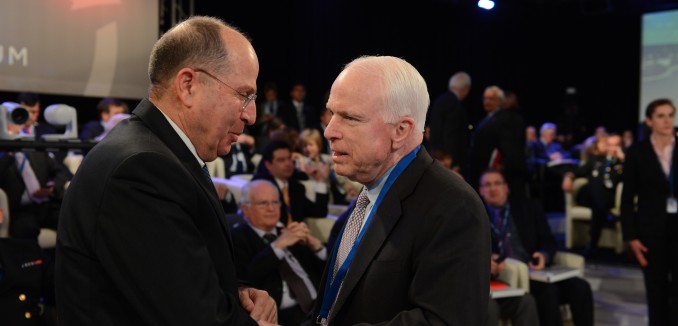Israel’s Defense Minister Moshe “Bogie” Ya’alon stunned both domestic and international observers yesterday when he signaled that he now leans in favor of a unilateral Israeli strike on Iran’s nuclear facilities, according to multiple reports. This comes in the wake of months of failed Western efforts, through the P5+1 states, to rein in the Iranian nuclear weapons project through negotiations and eased sanctions — and just two days after a senior state department official revealed that Iran was “very actively” violating UN embargoes on both its nuclear and ballistic missile programs. It also comes amid serious questions about the viability of the P5+1 as a functioning unit in grappling with Iran, given the heightened tensions between Russia and the Western powers over Ukraine.
Speaking at an event in Tel Aviv University, Ya’alon described his disappointment in what he considered the United States’ “demonstrating weakness” on the world stage. In his comments, Ya’alon stressed that he had changed his mind precisely because of the apparent unwillingness of the United States to confront the regime militarily:
We had thought the ones who should lead the campaign against Iran is the United States… But at some stage the United States entered into negotiations with them, and unhappily, when it comes to negotiating at a Persian bazaar, the Iranians were better…Therefore, on this matter, we have to behave as though we have nobody to look out for us but ourselves.
This is not the first time Ya’alon has modified his views on major international issues as new information became available. As commander of the IDF Central Command in the early 1990s, he was a supporter of the 1993 Oslo Accords that established the Palestinian Authority; his views changed, however, after he took up the post of chief of military intelligence in 1995, and he witnessed first-hand the preparations being made for future war.
In the case of striking Iran, Ya’alon has long believed that Iran must be confronted and a military assault might prove necessary. But up until now, he has strongly opposed an Israeli strike on the belief that the United States would eventually undertake the mission–his beliefs on the subject even spilling over into a public feud with then-Defense Minister Ehud Barak in 2012. However, in recent months he has concluded that the United States cannot be relied upon to protect Israel’s core interests vis à vis Iran. “I heard voices of disappointment in the region. I was in Singapore and heard disappointment about China getting stronger and the US getting weaker… Look what’s happening in Ukraine, where the United States is demonstrating weakness, unfortunately,” he said.
Ya’alon’s comments add to the voices around the world expressing concern over American weakness and the prospect of the United States’ looming failure to prevent a nuclear-armed Iran. But they also raise the possibility of a significant shift within the inner circle of Prime Minister Benjamin Netanyahu. With Iran just months away from being on the threshold of a nuclear weapon, and continuing its ballistic weapons and nuclear procurement at top speed, Israel will be under increased pressure to act alone if it concludes that Western powers are unwilling or unable to stop it.




